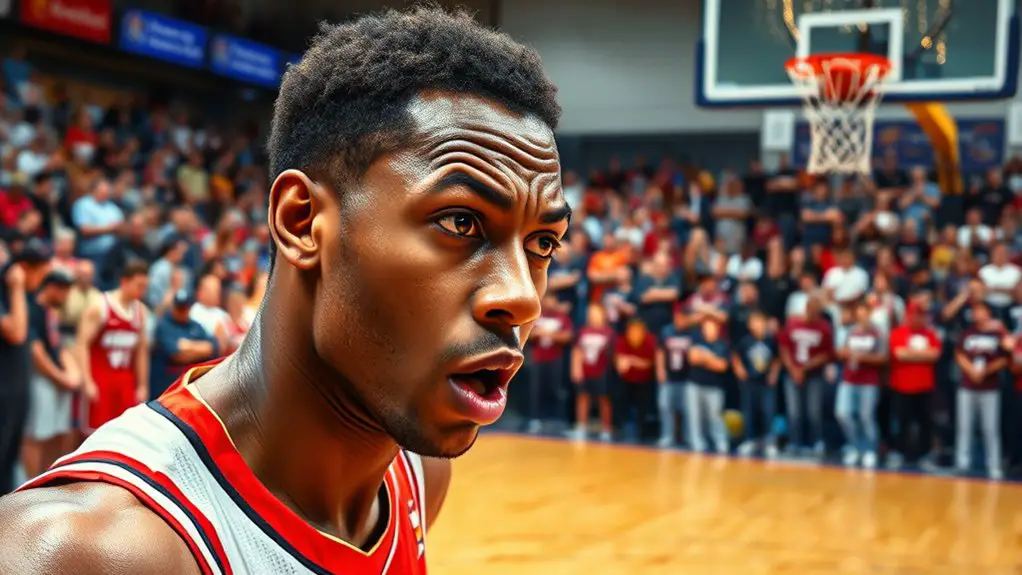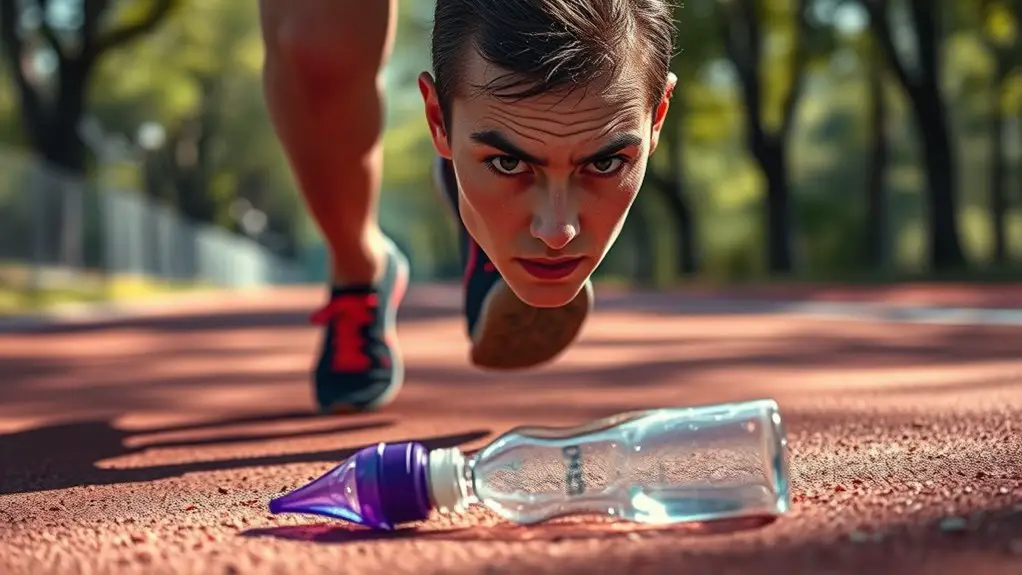Clutch performance in sports blends psychology and physiology. When you face high pressure, your mindset can either help or hinder you. Adrenaline kicks in, boosting strength and sharpening focus, but maintaining concentration is essential. Experience in critical moments helps you make instinctive decisions. Techniques like visualization and deep breathing can keep nerves in check. The best athletes harness these elements to shine under pressure. If you want to explore how it all works together, there's more to discover.
The Psychology of Pressure Situations
When you find yourself in a high-pressure situation, your mind can either be your greatest ally or your worst enemy. It's all about how you frame your thoughts. Instead of succumbing to doubt, embrace the challenge as an opportunity to showcase your skills. Channel your focus and visualize success, allowing that image to guide your actions. Remember, everyone feels pressure; it's how you respond that sets you apart. A calm mind fosters clarity, enabling you to make quick decisions and execute your game plan. Practice mindfulness techniques to stay present and grounded, freeing yourself from the weight of expectations. Ultimately, harnessing the psychology of pressure can transform your performance, leading to those unforgettable clutch moments you dream of.
The Role of Adrenaline in Athletic Performance
High-pressure situations often trigger a surge of adrenaline, which can greatly impact athletic performance. This hormone boosts your heart rate, increases blood flow to muscles, and heightens your senses, preparing you to act swiftly. While adrenaline can enhance your physical capabilities, it can also lead to jitters if not managed well. Here's a quick look at how adrenaline affects you:
| Effect | Description |
|---|---|
| Energy Boost | Increases energy and strength |
| Pain Tolerance | Reduces perception of pain |
| Reaction Time | Speeds up your reflexes |
| Focus Enhancement | Sharpens awareness and concentration |
Harnessing adrenaline effectively can be a game-changer, transforming pressure into powerful performance when it matters most.
Focus and Concentration Under Stress
While adrenaline can elevate your physical performance, maintaining focus and concentration under stress is equally crucial for success in sports. When the pressure's on, distractions can easily derail your performance. You've gotta train your mind to stay present, filtering out noise and honing in on your goals. Techniques like visualization can help you picture success, while deep breathing can calm your nerves. It's about finding that sweet spot where your mind's clear, and your body's ready to act. Remember, every moment counts, and the ability to focus can make all the difference. Trust in your preparation, embrace the challenge, and let your instincts guide you. In those clutch moments, it's your mental game that'll truly shine.
Experience and Its Impact on Decision-Making
Although talent plays an essential role in sports, experience often shapes the way athletes make decisions under pressure. When you've faced high-stakes situations repeatedly, you develop an instinct for what works and what doesn't. Each game, each moment, builds a mental library of choices, helping you trust your gut when it counts. Experience teaches you how to read the flow of the game, anticipate opponents' moves, and adapt quickly. It's not just about knowing the rules; it's about knowing yourself and your teammates in those critical moments. You can embrace the chaos, making split-second decisions that reflect your hard-earned wisdom. In the end, it's this blend of experience and intuition that often separates the good from the great.
Neurological Responses During Clutch Moments
When athletes find themselves in clutch moments, their brains undergo significant neurological changes that influence performance. Stress hormones, like adrenaline, flood the system, heightening awareness and sharpening focus. You may notice a surge in dopamine, making you feel more energized and motivated. This cocktail of chemicals can enhance your reflexes, allowing for quicker decision-making under pressure. However, it's a double-edged sword; too much stress can lead to panic and impaired judgment. Your brain's prefrontal cortex—the area responsible for rational thinking—might become less active, while emotional centers take charge. Understanding these neurological responses can empower you to harness your instincts and instincts and perform at your best when it counts. Embrace the moment; your brain's wired for freedom in those high-stakes scenarios.
The Influence of Training and Preparation
After experiencing the intense neurological responses during clutch moments, an athlete's performance heavily relies on the training and preparation they've undergone. You know that your body reacts instinctively when the pressure's on, but it's the hours of practice that truly set you apart. Each drill, every repetition, builds muscle memory, ensuring you can perform under pressure without overthinking.
When you've pushed your limits in training, you feel more confident facing high-stakes situations. You're not just reacting; you're executing a plan that's been ingrained in you through dedicated practice. This foundation allows you to stay calm and focused, tapping into the hard work you've put in. In the end, it's your preparation that transforms potential into peak performance when it matters most.
Mental Strategies Employed by Elite Athletes
While physical training is essential, mental strategies often play an equally important role in an athlete's success during clutch moments. To enhance your performance when it matters most, consider these key strategies:
- Visualization: Imagine yourself succeeding in high-pressure situations, which can boost confidence and reduce anxiety.
- Focus Techniques: Concentrate on the present moment, ignoring distractions and maintaining clarity of purpose.
- Positive Self-Talk: Use affirmations to counter negative thoughts, reinforcing your belief in your abilities.
- Breathing Exercises: Implement controlled breathing to manage stress levels and maintain composure.
Embracing these mental strategies can help you tap into your full potential, allowing you to thrive when the stakes are highest. Remember, your mind is just as powerful as your body.
Case Studies: Iconic Clutch Performances in Sports
Mental strategies can greatly enhance an athlete's performance in high-pressure situations, but real-life examples often illustrate the impact of these tactics. Think of Michael Jordan in the 1997 NBA Finals. With seconds left on the clock, he sank a vital three-pointer, showcasing not just skill but an unwavering mental focus. Similarly, consider Serena Williams at Wimbledon 2019; she faced match point and rallied back, demonstrating her resilience and tactical mindset. These moments remind you that clutch performances aren't just about physical prowess; they're about harnessing mental strength. Whether it's a last-minute goal in soccer or a game-winning touchdown in football, these athletes prove that the mind can be just as powerful as the body in achieving greatness under pressure.
Frequently Asked Questions
How Can Everyday Athletes Improve Their Clutch Performance in Games?
To improve your clutch performance, practice under pressure, visualize success, and stay focused. Develop a routine to calm nerves, embrace challenges, and trust your skills. Remember, confidence and resilience can elevate your game in vital moments.
What Physiological Changes Occur During High-Pressure Sports Moments?
During high-pressure moments, your body's like a finely tuned engine; adrenaline surges, heart races, and breathing quickens. These changes heighten your focus and energy, helping you rise to the occasion and seize freedom in the game.
Are There Specific Techniques for Managing Anxiety in Sports?
Yes, you can manage anxiety in sports by practicing deep breathing, visualization, and positive self-talk. These techniques help you focus, stay calm, and perform your best, allowing you to embrace the moment with confidence.
Do Certain Sports Inherently Require More Mental Toughness Than Others?
Sports like boxing and rock climbing require relentless resilience, while others, like chess, demand mental mastery. You'll feel freedom in pushing your limits, discovering that every sport challenges your mental toughness in unique ways.
How Do Team Dynamics Affect Individual Clutch Performances?
Team dynamics can greatly influence your clutch performance. When teammates trust and support you, it boosts confidence and reduces pressure. Conversely, tension or lack of cohesion can hinder your ability to perform under stress.




